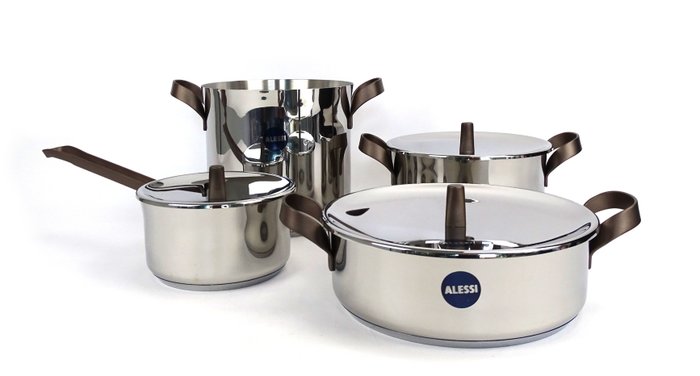编号 92260471

Alessi - Patricia Urquiola - 烹饪锅套装 (7) - ''江户'' - 手柄采用 18/10 不锈钢制成,带 PVD 涂层,棕色。磁性钢制底部
编号 92260471

Alessi - Patricia Urquiola - 烹饪锅套装 (7) - ''江户'' - 手柄采用 18/10 不锈钢制成,带 PVD 涂层,棕色。磁性钢制底部
This ‘’Edo’’ cookware series was designed in 2018 by Patricia Urquiola. This set is composed of one stockpot, one casserole, one low casserole, one saucepan and three lids in 18/10 stainless steel. Handles are also made in 18/10 stainless steel with PVD coating, brown. Magnetic steel bottom suitable for induction cooking. Polished on the exterior and satin finish on the interior
This ‘’Edo’’ set of pans constitute a blend of different cultural references and formal suggestions. A wealth and variety that the designer addresses with a fun and playful approach, a combination of references that brings to mind the very essence of cooking: the mixing of different ingredients to create dishes. The designer's idea was to soften an industrial production project with certain features which would diffuse the strict rules set by mass production: in particular, the slight flaring of the pots and the design of the handles recalling ribbons pinned to the body of the pans. The shape of the handles does not at all look as though it has been produced industrially, but instead crafted by hand.
This set of pans has never been used and the pans even have the original stickers on the bottom attached. Delivered with original packaging and documentation.
Dimensions:
Stockpot: cl 490 - cm 20 x 28.5 – h cm 19,0
Casserole: cl 280 - cm 20 x 28.5 – h cm 12,0
Low casserole: cl 325 - cm 24 x 33.0 – h cm 10,0
Saucepan: cl 130 - cm 16 x 33.0 – h cm 11,0
Lids:
(1) cm 16,0 x cm 16,0 - h cm 3,5.
(2) cm 20,0 x cm 20,0 - h cm 4,0. (can be used on Stockpot and Casserole)
(3) cm 24,0 x cm 24,0 - h cm 4,0.
- Heat sources: the entire “Edo” series is suitable for cooking on gas, electric plate, electromagnetic induction ceramic hob, electric resistance cooktops, or halogen lamp.
- Please read the instructions before using the pans.
- Alessi logos on the pans are stickers that can be removed.
- Dishwasher-safe
- The handles are practical and ergonomically designed. TIG welding is used to secure the handles while ensuring top quality jointing and hard wearing durability.
Patricia Urquiola and the ‘’Edo’’ project:
Basque roots, trained both in Spain and Italy, where she was a pupil of Achille Castiglioni, studied in Milan: apart from these highlights of her biography, it is difficult to fit in just a few brief lines the overflowing creative work of Patricia Urquiola. “We talk about inspiration as if it were something that is in the air and the designer were a being with a special sensitivity capable of perceiving it,” says the designer, “but for me it’s something within us all, it’s about emotional memory, emotional and cultural, which makes you perceive the elements that become driving forces in the project. It is a short circuit that is created between personal memory and reality”. These “short circuits” have also guided the design of the Edo pans: “ a whole range of references that play off each other”, she explains, “associations between things that are distant, but that in my head, are close. The name derives from the Latin edere, ‘I eat’, but it is also the ancient name of Tokyo, city of reference for me”. Japan is the origin of many of the pots that the designer uses in her kitchen, where uses a variety of utensils and ingredients from different origins. “This project”, she adds, “is my response to the changes I observe in society, to the multiplication of fantastic exchanges between different cultures”. Leading the designer is also the desire to create an object that does not seem mass-produced: the cylindrical shape of the containers is softened by a flaring, an invitation to the gesture of pouring; the burnished handles add a sense of lightness to the overall design. The designer’s Spanish roots lie in the shape of the lids: “I wanted it to be different from the others, concave rather than convex: a sort of Basque chapela. Once the Basque theme entered my head, I couldn’t get it it out anymore”.
About Alessi:
Alessi, a renowned Italian design brand founded in 1921 Giovanni Alessi, has become a symbol of cutting-edge design and innovative craftsmanship, especially in Postmodernism and Contemporary design as well as some Bauhaus objects. Over the decades, it has collaborated with iconic designers such as Alessandro Mendini, Aldo Rossi, Achille Castiglioni, Ettore Sottsass (a founder of the Memphis group), Michael Graves, Marcel Wanders, Richard Sapper, Zaha Hadid, the Bouroullec brothers, Tom Kovac, Toyo Ito, Jean Nouvel, Ron Arad, and Gio Ponti. These collaborations have cemented Alessi's reputation for creating timeless, functional pieces that double as works of art. The most celebrated design is Philippe Starck's Juicy Salif citrus squeezer, which almost became Alessi’s brand symbol in the minds of design lovers. This makes Alessi a brand with high impact and rich marriage with fundamental design DNA. More recently, a collaboration with Virgil Abloh's creative agency infused a fresh, modern sensibility into Alessi’s offerings.
